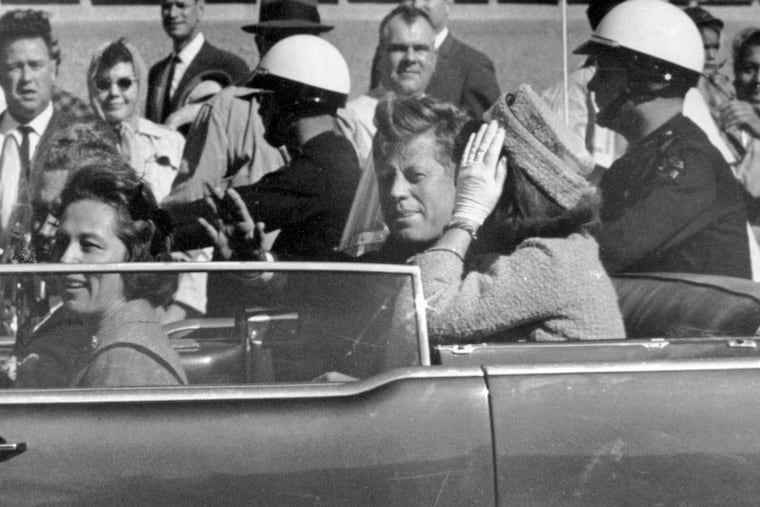JFK was shot 60 years ago. Here’s what I remember of that day in Philadelphia.
We didn’t know then that the bullets aimed at JFK were harbingers of yet more murders of our heroes.

On Nov. 22, 1963, I was 14 years old, a sophomore at Northeast High School. We were in gym class, out on the hockey field, the last period on a partly cloudy Friday afternoon. We hadn’t been outside very long when Mrs. Rapp, our gym teacher, blew the whistle around her neck and told us to line up to go back inside.
We knew right away when she didn’t blow the whistle at her usual deafening blast that something bad had happened. Rumors were flying. When we returned to the gym, the lights were off — another bad sign. We got into our assigned spaces on the gym floor, alphabetically by our last names, sewn onto the backs of our dark blue, not very flattering gym suits.
We sat there for what felt like an eternity, anxiously waiting. The PA system clicked on, with a deep feedback echo. The principal said that something terrible had happened.
President Kennedy had been shot in Dallas that afternoon.
A classmate sitting across from me leaned over and whispered, “Maybe we won’t have school Monday.”
Her comment made me sick, but I couldn’t really focus on what she said. I tried to console myself that the news couldn’t be true.
We were dismissed shortly thereafter. I walked home with my usual two friends, Lorraine and Sharon, down our usual route on Summerdale Avenue. As I put one foot in front of the other, I felt as though I was walking through a dark gray mist.
We didn’t know it then, but my generation would be glued to the TV with our families for four days, watching endless tape of the Dallas motorcade, of Jackie trying to climb out the rear of the car. I remember her bloodstained pink suit, Lyndon B. Johnson taking the oath of office in the rear of Air Force One, the riderless black horse, and John-John’s salute to his father. In those days, Walter Cronkite’s voice on CBS News was iconic, and his announcement of the assassination was played over and over.
We didn’t know it then, but the whole country would be eyewitnesses to JFK’s alleged assassin’s assassination, when Jack Ruby shot Lee Harvey Oswald on live TV during a prison transfer. There seemed to be no end to the madness and chaos.
We didn’t know that the bullets aimed at JFK were harbingers of yet more murders of our heroes: Robert F. Kennedy and the Rev. Dr. Martin Luther King Jr. Those bullets would rupture our innocence, time and again.
Those bullets would become forerunners of our now steady diet of individual and mass shootings, which are distressingly frequent in Philadelphia and nationwide.
Halfway through the 1.5-mile walk home from high school, I began to see a clear image out of the gray fog of shock and grief surrounding my vision. As we approached J.H. Moore Elementary, where I had spent the first seven years of my education, I saw the Stars and Stripes waving ever so slightly on the flagpole above the school. It was already flying at half-mast, hanging limply upon itself, the stars seeming to fall like tears from the sky.
It had to be true, then. Our president, John F. Kennedy, was dead.
These days, I live around the corner from a firehouse in South Philly. When I leave in the morning to walk my dog, I see the flag in front of the station. Too often in the last years, the flag has been at half-mast, in memory of lost law enforcement, firefighters, and mass shooting victims. Whenever I see the flag that way, my stomach flips.
In every generation is a moment, a public turning point, after which nothing is ever the same. For my parents’ generation, it may have been Pearl Harbor. For my daughter’s, it was Sept. 11. For others, it was the murder of George Floyd. For mine, it was the assassination of JFK.
These shocks were so huge that the political became personal — very personal — so that it seems as if the images of that event become etched not only onto our memories but onto our DNA, as well. JFK’s assassination, and the events after that day, have formed my perspective for the rest of my life.
Karen F. Zeitz is a lifelong Philly girl who grew up in the Northeast and now lives in South Philly. She has practiced law for 38 years with a current focus on wills and estates.